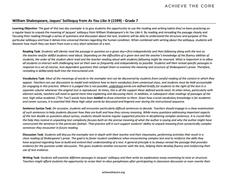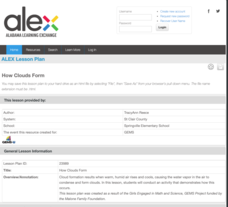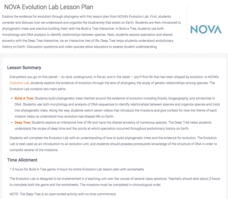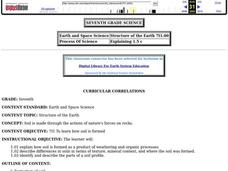Curated OER
ESL First Certificate/Advanced Vocabulary Formation Worksheet 19
In this ESL advanced vocabulary formation worksheet, students fill in the blanks in each sentence using the correct form of the words that are given in bold beneath each sentence.
Curated OER
Fruitful Questions
Learners examine a fruit-related Q & A Science Times article. They write their own food science questions and answer them in the same format as the article. For homework, they analyze their fruit consumption according to U.S....
Curated OER
Asking and Answering Questions Using Basic Vocabulary
Students practice making their own sentences that begin with "where" and restate them as statements. They use other question words to make sentences relating to health care. They answer the questions as well.
American Chemical Society
Forming a Precipitate
Can you mix two liquids to make a solid that is insoluble? Yes, you can, and pupils see this as the lesson uses more than one combination of liquids to form a solid. Through two teacher demonstrations and a hands-on activity, scholars...
American Chemical Society
Energy Levels, Electrons, and Ionic Boding
Learners see how electrons are transferred in the bonding of NaCl. They then create models of NaCl using styrofoam balls and toothpicks to assist them in explaining the formation of ions and ionic bonding.
American Chemical Society
Finding Volume: The Water Displacement Method
We have formulas for finding the volume of geometric shapes, but what if the shape is irregular? Lesson describes how to find volume through water displacement. After a demonstration, scholars practice in small groups. Then analysis...
American Chemical Society
Density of Water
We know solids have a density we can measure, but what about liquids? Lesson explores this concept and allows scholars to explore the relationship between volume and density. Graphing and analysis questions round out the activity.
Curated OER
Media Babies
What is a media baby? Discuss at what age children should be exposed to electronic media. After reading an article, they identify the types of media products for infants and toddlers. Learners will predict the effects of media on the...
Curated OER
"As You Like It" by William Shakespeare
Jacque's soliloquy from Act II, scene ii of As You Like It sets the stage for a close reading exercise that models how to approach difficult, dense text and enables readers to practice reading comprehension and analysis skills. Learners...
Science 4 Inquiry
Atmospheric Layers
Space diving refers to the act of jumping from outer space and falling through Earth's atmosphere before parachuting to land. Scholars learn about this extreme activity and study the layers of the atmosphere they must conquer in the...
Science 4 Inquiry
Temperature of Inner Planets
Mars, Earth, and Venus contain atmospheres that generate weather. Young scientists explore the temperature of inner planets. They create a model simulating the greenhouse effect before researching and answering guided questions to...
Curated OER
Solar System Socratic Questions
Students reflect on and discuss theories of how the solar system was formed. They respond to prompts in a structured sequence to relate the formation of the solar system and the age of the Earth.
Curated OER
Ask Questions About a Topic
Students explore reading comprehension by completing a graphic organizer. In this journalism technique instructional activity, students discuss important questions they can ask about stories they read to improve comprehension. Students...
Curated OER
Rocks and Their Properties: Day 5
Young scholars demonstrate their knowledge of rock formation processes in varied ways by sharing their cooperative research projects with the class. They generate well-framed questions in response to each presentation.
Alabama Learning Exchange
How Clouds Form
Young scholars analyze how clouds form. In this cloud formation lesson, students brainstorm types of clouds and what they think they're made of. Young scholars conduct an experiment to see how clouds form and discuss their observations....
Curated OER
Watch the Sky: Observing Clouds and Patterns
Young scholars observe clouds outside of the classroom. In this weather instructional activity, students investigate and record the clouds above their classroom everyday for three weeks. The young scholars then analyze their data and...
Curated OER
Avalanche
Students investigate natural disasters by participating in an experiment. In this water formation instructional activity, students define the dangers associated with avalanches and landslides. Students utilize a bag of sand, meter-stick...
Curated OER
Plural of Noun Formation Practice #1
In this plural nouns practice worksheet, students read an informative lesson about plural nouns. Students then respond to 20 questions that require them to make the shown nouns plural.
K20 LEARN
Argument Is Everywhere: Introduction to Argument
C.E.R = Claim + Evidence + Reasoning. That's the framework behind building a solid piece of argument writing. Introduce young writers to this format with an engaging lesson that uses YouTube videos and a PowerPoint to illustrate the...
PBS
NOVA Evolution Lab Lesson Plan
It doesn't matter if you look on land, in the air, underground, or in water—evolution is everywhere. Scholars complete worksheets with multiple question types as they progress through six online missions creating phylogenic trees.
NASA
Things Are Not Always What They Seem
Science is magic that works. Magical color-changing beads and a coffee can that follows voice commands are just two examples of magic tricks that rely on science. After completing a hands-on activity and an experiment investigating the...
Curated OER
Soil Formation
Seventh graders investigate how soil is formed. They analyze types of soil samples, examine soil using a magnifying glass or microscope, complete a chart, conduct a soil and plant experiment, and construct a soil profile.
Curated OER
ESOL Recognize Basic Questions
Students review information questions with who, what, when and where. They orally practice answering questions as a class then work in pairs to practice all questions and answers orally.
West Virginia Department of Education
Editorials: The Guiding Voice of Authority?
How much can opinion influence a news story? A standalone resource discusses the importance of John Brown's Raid through the lens of journalism. Learners analyze two different texts, one from the perspective of the North and the other of...

























